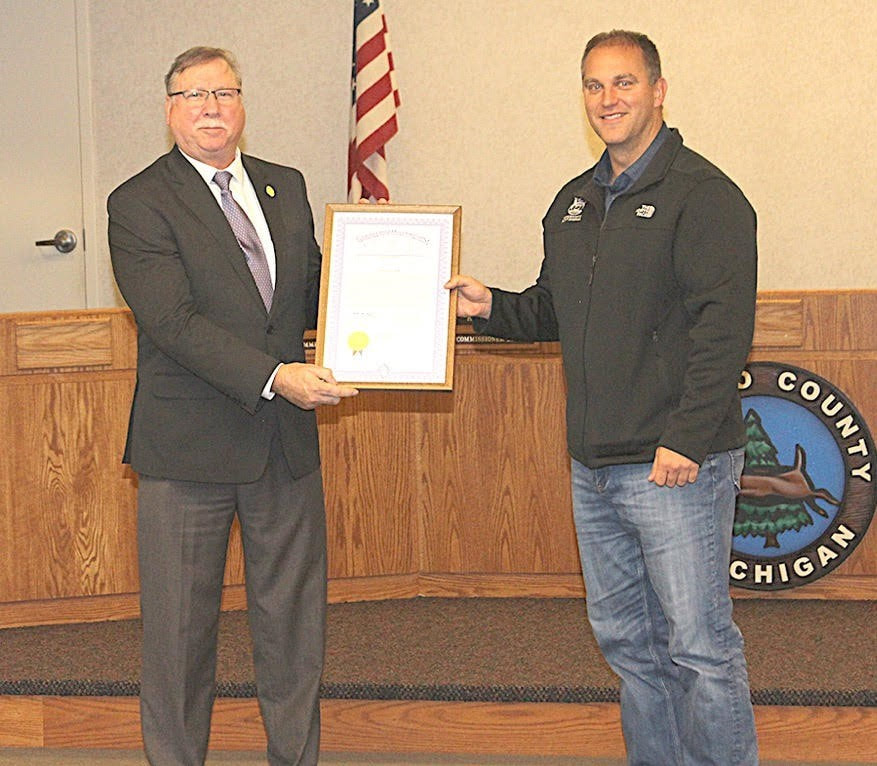|
State organization honors NC ROD
The year 2020 proved to be a challenging one as COVID-19 closed most county government offices for an extended period, even as real estate transactions continued and even increased in many areas of the state. Home sales boomed, especially in vacation areas, as did mortgage refinancing due to falling interest rates. Knowing that Michigan’s real estate economy would have ground to a halt otherwise, Registers of Deeds offices worked overtime to develop alternative systems to keep transactions, and Michigan’s economy, moving. Newaygo County Register of Deeds Stewart Sanders, MARD’s 2020 president, was named by his colleagues as the Register of the Year for his leadership as MARD members navigated technological challenges posed by operating during COVID-19. “It was a great honor to receive the Register of the Year award. I had a lot of support from our MARD board as we handled several tough issues. Everyone stepped up and did a great job. We will certainly be well represented with the new incoming board of skilled, dedicated public servants and as a result, MARD will be on the tight track moving forward into 2021,” said Sanders. We caught up with a busy Mr. Sanders to pose a few questions to our resident president. You became ROD in 2014 after a career in education.What led you to pursue the position? My interest in local politics, surveying, and real estate started when I was younger as my father was engaged in local politics serving on the County Board of Commissioners, his survey business served as the Newaygo County Surveyor in the mid to late 60’s, and he also owned and managed Town and Country Real Estate. Being around this influence helped to foster my interest in these areas. When the position of Register of Deeds was posted as open with the retirement of Newaygo County Register Linda Landheer, I applied as the Register position embodies all 3 items I just outlined. I was fortunate to be appointed June 19, 2014 and elected in 2016. What are the primary duties of a ROD? Registers of Deeds all across the State of Michigan are charged with reviewing, recording, and maintaining the public record into perpetuity. The Register’s office is tasked to put on public record any recordable document following prescribed recording requirements set forth in Michigan law as the Register’s office is the legal repository for these documents. The analogy is much like a bank in that the bank teller scrutinizes checks and cash to make sure it is legal tender; we scrutinize documents affecting real property much the same way in making sure that these instruments follow Michigan recording requirements. The Register’s office is directly tied to the Title and Mortgage Industry; without the Register’s office, the Title Industry cannot perform its function thus no mortgage money is released. Last year (2019) our office recorded over $200,000,000.00 in conveyance documents with mortgages in which these dollars are released into the economy of Newaygo County. You have been elected President of MARD. What is the vision of the organization and how does involvement in it benefit the people of NC? Along with being elected President of the Michigan Association of Registers of Deeds (MARD) for 2020, I also Co-Chaired the Legislative Committee for 2 years. Being engaged in our state wide association allows me the opportunity to collaborate with our recording partners such as Michigan Land Title, Michigan Bankers, Michigan Credit Unions, and others along with State legislators to foster sound recording law. Issues such as Michigan’s predictable fee structure (flat fee for most recordable documents), e-recording of documents, and electronic-notary services are the most recent matters that I have worked on to help the residents of Newaygo County and the State of Michigan facilitate a safe, secure, cost effective, and convenient real property recording experience. One of the long range goals of MARD is to ensure that this collaboration with all of our recording partners results in continued sound recording practice. The honor you received cited ‘navigating tech challenges by operating during COVID-19. What challenges, how were they met and what has (if anything) changed? COVID-19. One of the main challenges we face as Registers of Deeds occurred in March of this year. As most of the State was shutting down to limit exposure to the virus, Registers offices all across the State faced new challenges of keeping offices processing documents. Register’s offices were deemed essential to the financial sector by U.S. Treasury Secretary Steve Mnuchin along with the Michigan Department of Insurance and Financial Services. What transpired from that was a realization that each Register’s office would have to adapt to a new normal of recording documents. Some Counties were able to work remotely, some worked remotely and on site, and some still solely worked on site (which is what Newaygo County engaged in). One of the early challenges was Governor Whitmer’s early executive order EO-41 which allowed for documents to be electronically notarized using any of the new e-notary technologies so that residents wouldn’t have to appear in person. This is a medium we are seeing right now all across the State of Michigan as a result of dealing with COVID-19. Certainly the use of more technologies to record documents has kept all of us as Registers extremely busy. What challenges lie ahead for the ROD department? The Registers of Deeds offices across Michigan will be facing an ever changing technology world. Keeping abreast of these new technologies and to keep watch over the public record to make sure it is securely protected will be the charge of Registers on into the future.
0 Comments
Your comment will be posted after it is approved.
Leave a Reply. |
CategoriesArchives
April 2024
|

 RSS Feed
RSS Feed